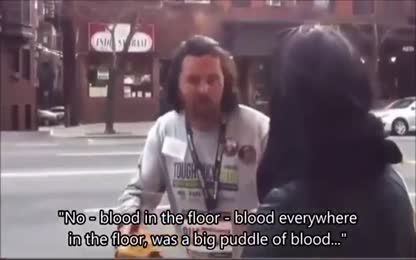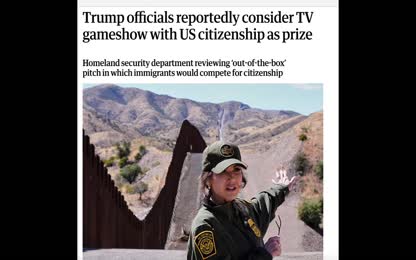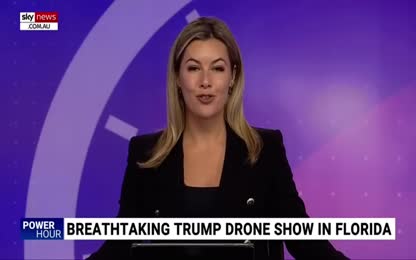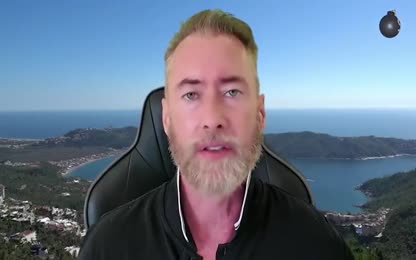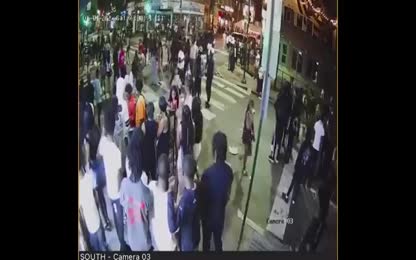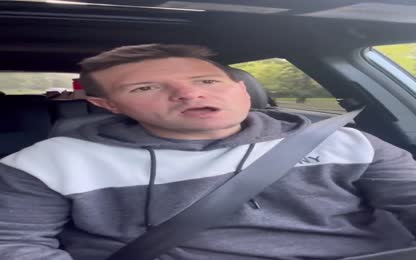Advertisement
New JFK Show # 270 Carlos Gutiérrez Menoyo/ Lee Oswald’s Passport and the FBI.
Some historical figures tend to go forgotten if not ignored altogether as the nonstop river of time and history flows on. Others take on a larger-than-life aura because of their bravery and willingness to put their ideology above their own lives. Part 2 is proof of FBI involvement in the assassination.
- Category: The New JFK Show ,The Real Deal ,The Power Hour
- Duration: 54:27
- Date: 2022-08-11 03:44:19
- Tags: no-tag
2 Comments
Video Transcript:
Welcome to the new JFK show number 270. We're going to be using the JFK blog, which is Larry isn't control of. So his Spanish is a lot better than mine. So we're going to turn it over to Larry after a gym gives us a few words. Yeah. Well, it's just horrific to have the gang back here. I was doing the course on critical thinking and conspiracy theories for 15 weeks. So happily that's now come to a conclusion. It conflicted with the time we're doing these shows and we're so glad to have Larry Gary me back in the saddle again. Larry, I've made you the host. Take it over, Mike, for him. Thank you, Jim. A lot of things going on. Of course, as we continue to plow through records and new information coming out and we've been doing this for a long time. We've got a special show tonight because we're going to sub divided here. The first part of the show is going to be on something that would have happened in Cuba and Havana and which would have changed history all together regarding Fidel Castro. And the other portion at the end, we're going to talk about Leo Zwell's actual passport, the one that he took and in in New Orleans in June of 1963, the summer where arrest is Pena. I believe it was the 25th of June and they both did their passports on the same day. And that passport in particular, Jim and Gary, I don't think of anybody who has ever seen it before. I think tonight we're going to short for the first time. And it's not. Now the JFK exclusive. Yeah, yeah, because everybody talks about Lee's passport for when he went to the Soviet Union and won the 1959. All right, but nobody talks about passport D092526, which is the one that there was given to Lee when he renewed it in June of 1963. And what he did or what did not do with that passport is what really intrigues me and we'll talk about that in a minute. I'm going to go right here real quick and talk about this guy Carlos Voteris Menonio. Rambo. Yeah. And I promise you that half of them are based upon this guy. They shouldn't make a movie about this guy, you know, when you go and fight in Africa, you know, in the African theater, World War 2. After, you know, you're only 15, 16 years old, you, you leave Spain after Franco, you know, the fascist take over the country and you decide to go to France and all the Sunday World War 2 explodes, you know, and you find yourself fighting with Leclerc in Africa, you know, against Romano and, you know, that kind of thing. And I'm sorry about that. You know, a teenager, you know, and maybe we need to talk about this guy a little bit, you know, and how he could have affected history. Had he done what he tried to do on that 13th day of March, 1967, where, you know, a group of student freedom fighters, you know, tried to take out full hands. You know, on that attack on the presidential palace, and that's what we're Carlos Menoriel comes in, you know, and, you know, let's talk about this guy. Right thing up your screen share. Yeah, yeah, let me screen share a quick, I thought I had already done it, but here you go. Yeah, whenever you see a movie and they're coming through at the machine, guys, trying to get him. This is the good. The good. You know, very important family, you know, in the fight against Castro, the law, by the way, the younger brother fought against Batista from the Escambraille mountains, you know, the. Yes, and F, II, Frenta de Escambraille, which was a national, and they were fighting against Batista, but from a position closer to Havana, where Fidel Castro once he settled in the Sierra Maestra was west of. Of a law, okay, and his group of guerrillas fighting from the Escambraille mountains, which were only a couple of hours away from Havana, Jim and Gary. So when Castro finally arrived in Havana after, you know, at the beginning of 1959 there, you know, Illinois and William Morgan, the American freedom fighter, who went up to fight with him. They have been waiting for Castro for a week and Che Guevara, you know, so the story of Carlos Gutierrez, you know, is incredible. So let's just talk about this guy for maybe 20 minutes and then we'll move on to the passport thing. Henry, you're bossing sure some historical figures tend to be forgotten, if not ignored altogether is the nonstop river of time and history flows on. Others take on a larger than live oral because of their bravery and willingness to put their ideology above their own lives, such as a case of one, Carlos Gutierrez, Menoyah, of course, his younger brother, Elroy obtained fame and notoriety in the late 1950s. In early 60s, Carlos never did. However, it was Carlos who paved the way for Eloy to take the baton and run with it in their quest to liberate Cuba from the clutches of first and asked the dictatorship. In the second, the communist state that came after the successful revolution that caught rid of the dictatorship, unfortunately, neither of them was successful. And only the accurate portrayal of their struggles remains as consolation. Eloy's story is highly convoluted where times documents contradict each other. That is not surprising because after he broke with Castro in 1960, the state controlled media continuously faded him in a negative light. And let me just say real quick here, Jim, that the reason that that happened in 1960 is what Eloy was very smart and perceptive in what was going on. And when he saw people like Shegavara who were Marxists and communists and how the revolution was starting to... Yeah, yeah, some people to be remunerated when they shouldn't have been in that kind of thing. The first thing that Eloy said, look, if there's any communist element here, I want to know about it and I'm not going to be a part of it. And that's exactly... And he stuck to that until he died, you know, Eloy. And we're talking about Eloy, who was Karls' younger brother. And he's the one that fought with... In the Eskambra, to take out Batista at the end and they waited for Castro for a whole week in Helena before. And that's how the whole thing was consummated. So let's go. You mean they waited for Castro to actually make the entry into Havana, the security city? Yeah, because there were only a couple of hours away in the Eskambra, which is south of Little South East of Havana. And I wish I should have put up a map here to show you know, but Fidel was in the Sierra Manestro, which was Oriente, east of... Well, East of Havana. That's why it took him a whole week to get there, you know, after, you know, Eloy and his people were had already been there for a whole week. Yeah, what if... What if, in the case that Eloy that could have dumped Batista, but they waited for Castro because he was to be the leader of the new state? Exactly. And which Fidel, you know, was in the right place the right time, you know, because all the... And this is part of what we're going to talk about here tonight. How he was the last man standing, you know, so... And because the people that were involved in the assault in the palace in 1957, we're going to talk about which included Carlos Menorio. Those were the people that would have taken Cuba, you know, into the 1960s, you know, and then we'll talk about real quickly here at Chamorrhea, who was the student... The leader of the student movement in the University of Havana, and he was also part of this whole thing that we're going to talk about here, where they tried to assassinate Batista in his presidential palace. Yeah, the problem. The problem with overthrowing governments is the guy that comes behind him is not exactly what you had in mind. New boss and same as the old boss. And that's a lot of what happened with Eloy later on because when they tried to say, hey, you know, we got other people here who will invade, you know, 1961. But, you know, most of the people that were going to come would have been Batista cronies, so it would have been the whole thing all over again. And that's what Eloy, you know, did not want. You know, he wanted, you know, democracy, you wanted elections in that kind of. So this is his older brother. The carloist side of the battle on the other hand would certainly promote special interest because of the his international exposure in Spain and the European World War II theaters of war. Who was this guy who must almost single handedly change Cuba and world history had he taken out who we see top Batista that take full afternoon of 13 March 19, 15. So he. In school, right. Yeah, right here in a rare self published booklet title in Ralarista, a short story by Eloy while he was in prison. Actually, he spent, I believe 22, 25 years in prison. And his daughter, Elena Patricia, who was my friend, included in this epilogue an essay by an individual using the student of Pedro Panamo. Like, Pedro Panamo is one of the most important novels of Latin America by one through for 1955. A surrealist type of novel, which, you know, just blows my I'm not going to go into that at this moment, but very, very famous top of the line. So the sky with a student in Pedro Panamo, he writes, you know, this little story about Carlos Gutierrez and the whole family, you know, and how they had been fighting against Franco's fascism in Spain, where the family, the patriarch, Dr. Carlos Gutierrez, Savaleta was drafted as a doctor into the Republican Army. And to first born, Ho Santonio died in battle in October, 1937. That was the, you know, the oldest to the history in Cuba, beginning with the, with Carlos Gutierrez Menorio, who became the military leader in Havana of the D.R.E. that the Victoria revolution, I just, as to the end deal. And who died in the attempt to assault on Cuban dictator for the east as presidential palace. And then to all the way to a law, you know, as we go down, you know, the family tree, who found the S.N.F.E. and the international and the scumbag, which we have been talking about, where the mountain ridge, you know, writes out of Atlanta. And later take Carlos's place in an effort to liberate Cuba from the US, from the support of the US support of these dictatorships. So this is all, you know, from an article and this is a very rare photo that I found and I found this in Cuban blogs from Cuba. You know, that you can go and visit and there's a lot of information coming out now. Before I believe when there were restrictions in the, on the internet, Jim, and maybe you can, you know, chime in here on that, you know, over the years, if that has been improving or because before I remember that, you know, it was forbidden. But it seems today that there are certain blogs, you know, and a lot of these talk about, you know, Carlos Cucheras Menorio, and, you know, the assault on the presidential palace. When they try to take out the piece out there, you know, so as you know, the internet is, you know, supposed to be completely wide and open, but. There was a golden age from around 1980 to 95 when actually it was very open and you really could find almost anything that anyone had ever published or put up. It was a wonderful period, but. Yeah, but. Too many too many were learning too many truths about the corruption of their own government for them to be able to sustain freedom. Everything everything was going fine until Jim wrote this book called Sandy Hook. All right, so you can pick it up there there. You should be noted that Carlos would join the French resistance under General Philippi Le Clareq in France at 16 during World War two. Yeah, just to pay in campaigns in Africa versus Ramall, who along with patent were probably the two greatest tank commanders in world history. He fought in Italy and later landed in Normandy continuing all the way to Germany. He wrote triumphantly into Paris upon its liberation and was a seasoned resistance veteran by the time Batista took over in 1952. Having also participated along with Adele Castro and Rolando, Macea Err and the Cairo, Conor Fist. I think the American Republican overthrow Raphael Leonardo Strohio in 19. A very very quite a forgotten event in history there in 1947 where you know Cuba, you know Trujillo, of course, you know notorious as he was. And another dictatorship, you know in the Caribbean and where this would you know this group of freedom fighters would try to go and you know take out Trujillo in 1947. And Carlos was writing a mill of all this. And if you look at the map, Cairo, Conor Fist was writing in the north edge there of Cuba and from there they would pass it to the Dominican Republic. And then after that, you're going to find out that this whole thing got turned out completely around when Trujillo tried to invade and take out. He dealt Castro in 1960 in the training that affair. So this is like a back and forth thing going on here. Okay, so anyway, we'll talk and we'll go out and go ahead to here on now. I'm what Carlos joined the French business in World War II, a photo of you entering the liberated Paris, a Bartolac-Laclac division tank. He was a formidable warrior. Oh, yeah, yeah, yeah, yeah. Okay. I see that is the presidential palace. The Pistas, all right. And this is what happened on 13th of March 1957. And this this whole operation, which was led by mostly people, two people, like I said, José Antonio Echevorea. The guy who was the leader of the students in Havana and Carlos Gutierrez Menorio, who was in charge of the military aspect of the operation. The only first hand accounts of the assault on the presidential palace above on 13 March 1957 can be found online in Cuba news blogs. They are important narratives that define the curriculum courage of Carlos Gutierrez Menorio. Elevated to a sort of pallidant for liberty and justice, have gone will travel. Yeah, it's clear from these passages he had a backup team to assist. Carlos and his men had had been entirely different in Fidel Castro. Rue's would have only been an afterthought in Cuban history. Here are some of the most vivid accounts. Why? Why? Because had they taken out Batista, Fidel Castro would have stayed in Mexico. He would have never had to go in the grandmau with you know, any something other guerrillas and landed, you know, you know, in all the ways that they were like, cool by it then finally, you know, be, you know, the protagonist of the entire revolution here would have never happened to him. He could have been writing the history books. That's one of the exactly, okay. So, okay. So, here's the translation right down here and this is heavy duty stuff right here. Yeah, I don't see the translation yet right here around 35 men led by Faudé Chamon and Carlos Gutierrez Menorio left a share house. Well, that's a little bit I think. Huh? I think you got to scroll up. I'm at the top already. He's reading this man. Oh, here it is. Here it is. Here it is. Around 35 men read by Faudé Chamon and Carlos Gutierrez Menorio left a safe house on the way first in 24 streets in El Vidaldo in a closed truck together with two cars toward the palace upon arrival. Catera is Menorio got out of the car with his machine gun struck down the posted guards and entered the building along with Louis. Bepe Castellanos and Luis Coico chair. Yeah, they appreciate you're getting the name. And what is that? He Jose waguemano most of whom fell into action in a few minutes. They were already in the office of the dictator. Who's yeah, if Battista who escaped through a secret door the building to the roof from where the garrison made easy targets of the attackers and Carlos. Scoot-Dress and Sambo of his companions were killed. Too bad. It gets better. These are, I've collected different versions from different people in a very interesting way. At the palace Carlos, Pepe, and so arrived at the Hall of Mirrors. We got to the door of the board, and dictators office, the latter testified. We're excited voices inside. Go to your shout it come out with your hands up. The answer was a shot that shattered the glass door. Carlos, who forgarnates the hole in the broken glass, the first three, however, did not explode on the floor. Three out of it. That's, that would be pretty troubling. And explode on the fourth and explode with her instantly. We went through the door firing our weapons to dead menly on the floor. The office was empty. We tried to find a secret passageway that we had been told leak, but he's this office to his rooms on the third floor. Impossible to achieve. According to Goi Goi Chair. And those are a couple of dead bodies there at the top, right? No, no, those are sex. Oh, yeah. Okay. Yeah. We left the office and headed to our spiral staircase to try to reach the third floor useless from the roof of the upper floor. They were firing at us mercilessly. We were already short of ammunition. Carlos machine got a jam. Castellano said empty magazines. To work, hadn't appeared anywhere. They were. They were. Yeah. And that's the key to the whole to the failure of the operation that the. And you know, at the end, you know, just either mention it either by because of cowardice or because of logistics, you know, we don't know. Go ahead. Yeah. It's almost tutorial. We got to flip it at a more. Okay. Okay. Okay. Here are these are pictures. Actually pictures. Of the presidential palace in the area when it's firefight. A curfew gem. Yeah. And yeah. Thank you. I'm just a tutorial upon entering the palace and taking to the left wing of the building. I advanced to the bottom shooting. Oh, you're shooting the firefighting is intense. I changed the magazine kept shooting there upon. I see they wound. Mario. I see him painting. Paul him toward me. It's Mario's blood. Carlos Guteraz did not lose his optimism. However, I look. Yeah. A guy is rolling on the third floor. Let's go. He shot it. Much of the people pointed out to him the need to bring in their comrades who were fighting from the ground floor is reinforcement. Carlos agreed. Went back to look for them. I'm accompanied by Castelano. So they headed down the hall toward the stairs unaware. They were exposing themselves to the fire on the third floor. They both fell dead. That's right. Wow. Not good. Not good. No, no, well, you know, like I said, you know, unfortunately when examining the historical record, most if not all the credit goes to Jose Antonio Cevafea leader. Like I said, of the student movement at the University of Bavana there, the R.E. which later on, you know, branched to Miami and New Orleans and all that, you know, bring in whatever. His mission was all it holds. Right. Yeah. His mission and his mission was to go and take over the radio station, radio, and coordinate his message with the attack on the power. So they were going to go, hey, we just took out the tea style, you know, and, you know, democracy, you know, and so and his squad was successful in this part of the mission and his transmit the transmission announcing the coup did make it onto the airways before they brought up. Yeah. They broadcast that the coup had taken place. Yeah. And everything was under control. And our boys are laying dead. Not knowing, not knowing what had actually happened at the power. Exactly. But really happens is that I think it was power to see those people didn't show up. I mean, look at when yeah, well, you know, and that's where, you know, the whole thing about the receipt of Carlos comes in because you know, when this happened, he was already in his 30s. You know, he wasn't, you know, a little spring chicken or anything like that. He'd remember that he'd had a lot of experience, you know, and in World War II and everything. And that's why he was put into the position of being what I would call, you know, the tip of the spear of the operation. So, you know, if you want to go here, the truth of the matter is that even though at Cheverea did risk everything was fell by Batista. It was Carlos who was the tip of the spear. Like I just mentioned of the operation who arrived arrived at the presidential palace with guns blazing. You know, remember, you know, he took out the guards, you know, on the first floor there and wasn't Batista's office within minutes. A stairway, and this is one of the things that might be still like a legend or something because some versions say that Batista escaped in a secret stairway and passageway, you know, and he got away and everything. However, people in the know who knew, you know, how everything was arranged there in the presidential palace said, no, no, that was just a regular stairway that was used regularly after functions or whatever there, you know, in his office, and that it had absolutely nothing to do where he would use that, you know, like Batman, you know, okay, spinning around. Yeah. So anyway, and like I said, a backup support squad which never showed up caused by either logistical failure or, you know, perhaps even cowardice actually sealed Carlos's fate that day. And he is actually in Cuba. He is considered, you know, a legend in everything and actually have named buildings and and and sports complexes after him, you know, and that kind of thing. That's a that's a terrific story, Larry. I love it. Yeah, Rambo, you know, before Rambo even existed, you know, yeah, I feel like I've been watching Netflix. Let me uh, let me get here. Here's now to Oswald Passport, right? Yeah, yeah, yeah, yeah. Yeah. Shit. Yeah, that was exciting story. I mean guns blazing right down the palace. But he's going down the stairs. But he said, oh, his days were number. Yeah. Jim Garrison is the one that said it. He says in a big operation, things go wrong just like not killing Lee at the movie theater. And things certainly when you're here, especially when you're down at the radio station saying you just, you know, accomplished successful coup. All right. You find out they're coming to get you. For real, huh? Yeah. Okay. I look, let's uh, this is good stuff coming up here. Hold on. Let me let me uh, are we are we still on one? Yeah, he's on his screen share. All right. So we have from the beginning, there was one passport. Right? And he this is the one that Lee used to go, you know, the Soviet Union and whatever. You guys know anything about this, you know, and uh, 1959. I want to hear it. It's good. Yeah, because there's so we all know that Lee renewed his passport in June of 1963, months before the assassination, months before Mexico City. Excuse me. And um, um, some of the accepted information and uh, about the whole Mexico City thing and and and Lee, how he got to Mexico, you know, with a visa that he uh, supposedly took out in in in Orleans. All right. And then from there, he went and took a bus, right? And went to Mexico City and registered in a hotel and a sleazy bag and they'll tell whatever then did his whole thing, you know, that they've told us that he did at the uh, the Cuban uh, embassy and also the Soviet thing, you know, which has been, you know, the accepted version. Okay. But what about the passport that he renewed on June the 25th, June 24th and June 25th in New Orleans, uh, before the soldier and, you know, out to to Mexico, Mexico supposedly Mexico City and you know, what were the documents that were used here? And and before you know, even getting into and to any of this, you know, Sylvia Mar, you know, she said, you know, not valid for travel to Cuba, not valid for travel to Cuba. That is so key here. Excuse me, um, because if this was the moment time, then, I mean, that's where he wanted it goes, how the hell could he go there if it wasn't valid for travel to Cuba? Exactly. How in the hell are you going to, you know, get this whole thing, land dunk, slam dunk, you know, and and and we'll look at the actual visa, uh, tourist card and this is the actual passport application of the 25th year and uh, and some of your information here, I'm dying, I'm dying to ask the question, Larry, I have to ask the question, have you shown this to Judy? Oh, no, no, no, actually, no, no, it's and uh, and then, you know, you're going to find out here who, this is so crazy, who is the guy who takes possession of the passport and the whole file on the weekend of November 22nd, 1963, our old friend, what does it say here? Warren C. The Bruce. The Bruce. Hello. Wow. Larry. Man, there's a few shows that people meet can go back. Um, I'll put, I'll leave them in the link, but there's some shows that really fall, pre-seed this. Let me tell you something about this, because this one, I don't know why people don't look at this. This is the, well, you know, let's, you know, we can, you know, this whole thing is nine pages, but uh, is anybody ever, hello, has anybody ever looked at this, you know, in detail here? The way that you should not to my knowledge, Larry, you're doing blazing, trail, and research here. That gun's blazing. Yeah, I got blazing. I'm in the JFK community. I call it the theater of the absurd. Wow. So I, now debris, for people that don't know, just gives us a little quick about debris. He had an office. He was an FBI agent right across the street from a bar where everyone was hanging up. He was obviously Oswald's handler, and he had a list of people that he, um, his, uh, informants. In fact, um, yeah, um, I forgot the guy's name, but he's one of the first people I ever saw come on and say, yes, I was an FBI informant. What was his name? He had a bus arrest us. Oh, yeah. Yeah. The rest is the Cuban guy. So man, this is um, it's solved, Larry. It's, I mean, my god. Well, the thing about this is that, you know, Lee takes out a brand new, spanky new passport June the 25th, and then, but they need to size to supposedly go to Mexico and he doesn't use the passport as the main documents for the tourist card. He uses supposedly uses his budget certificate, all right, which obviously does not have a picture, of course. Obviously, you know, you're born your baby. You know, how you're going to put that on there, right? And, and, and that is the mode of identification. How could they, how could they do that, Larry? That's just absurd. You know, no idea whether this was right to make it add anything to do with the man standing in front of you. I mean, this is just, this is a false. That's why it's called theater of the absurd. You're good. Uh, before I go back, go back over the, uh, the, the, the passport. I'm interested in that, Larry. Of course, you know, and, and you know, something, go ahead and do a surge anywhere online. You're not going to find it. Okay. I found it in a specific place where it was, see the, uh, fingers here holding the passport on the left. Okay. This was done at the Dallas Police Department, the weekend of the assassination, when the passport was found, not in Ruth Payne's garage. Don't tell me it was outside of building. There was just been hit by a black It was found all over on North Beckley. All right. It was found at North Beckley, tent where you guys, you guys, the rooming house, the way and dead, you know, we did shows to them, we did videos and everything in front of the rooming house. Remember? Yeah. I don't think he's there anymore. Anyway, this is the passport. And as you can see, Jim and Gary Cuba, what does this say here? It says not to be, you go to Cuba, you can be prosecuted. It's not why, I mean, this whole house of cars, Jim and Gary just, just on this, you know, yeah, yeah. I love when government documents contradict the government's official account. I love it. It doesn't get any better than this here, you know. That's about as good as, yes, yes, I agree. I mean, I would have dig it was. So, I'll read the dick you lost. So, let me, let me, because still, you know, she, you know, she had the way that she presented, you know, I thought it was, you know, the best. So she was, I'll pick it up right here, such permission is normally withheld from Americans with passports, not valid for travel to Cuba, Jim. Then Gary, that is why Americans who defied the van and visited Cuba had to go by way of Prague or other Eastern European capitals, travel to Cuba via Europe was far beyond Lee's known means, obviously, you know, right. He was scarcely unaware of that. That's right. Who knows where he actually was physically at this moment in time. And that you mentioned that, that's exactly if he was overseas on that passport that we just showed, it would have shown entry and exit visas, correct. So, but normally, yes. So, maybe he could have been in China, you know, for example, exactly, he could have been in Minsk, you know, whatever, but he could have been in Omaha and joined a good American state. So, we all know about arrestists who Gary, you know, acquired, you know, a little while ago, and recall that he renewed his passport on exactly the same day that lead it on 24 June 1963. Hania? And yeah, Hania. And then so, that's why the FBI thought, hey, you know, this this thing might be connected here, you know, Hoover and Tulson and, you know, smart Alex. So, you know, then arrestist passport is printed and it comes out in the Warren Commission, Commission document, 1307. And it's like 12 or 13 pages long. All it is is on arrestist of passport, the same one that he renewed on a same day with lead. However, we do not have the same treatment of lead passport as Orestis had, all right? So, why would that be? Right here. And we just talked about this here. And at this time, I had only been able to zoom in and find arrestists, then later on, you know, I found these actual passports, the one that was recovered as a rooming house at 1026, Rebecca Lee, not at Ruth Payne's house, okay? Now, why? Why was that found at North Beckley? You know, I think that opens up a whole new Ken of warms here. But anyway, if this were the case, indeed, the entire House of Cards of Mexico City, Cuban and Soviet embassy visits would have been a colossal rule that has never been challenged before, based on a simple consideration of State Department guidelines during this volatile period. It would also explain why not a single monthly Lee envoy? Remember when we talked, how many of shows we did about Lee envoy, which was the wiretapping operation there on the Soviet and the Cuban installations there, where there wasn't a single report there and it said, hey, you know, this crazy ass wants to, you know, go to Cuba. And he wants to use this passport that says what? Hello, in valid. Right? It's an happened. And it happened, okay? Excuse me. And, and of course, all the government officials involved in framing him on the war and the staff knew all this to be the fact. Absolutely. In fact, I have documents there that say, hey, we know all about this shit, you know, we know that you can't go to Cuba on a, on a US passport. Hello, so why this whole shenanigans shit, you know, in Mexico City, you know, it doesn't obviously, you know, so this is good stuff, where it's good stuff. So the reader, you should know that the CIA casts a wide net precisely trying to plug the movement of subversives from Mexico to Cuba as seen in the report title, the movement of subversives. And I have that document where laid out exactly the strategy Mexico to date has taken two significant steps to control travel to Cuba. Hello. And if you find somebody like Lee Oswald, we're going to report on that right away, Jim. Where it is a joke theater of the absurd indeed. It has instituted close surveillance of other travelers and the photographing, photographing them all persons arriving from or departing Cuba and has given tacit approval, the suspension of service of Campaña, Mexico and Adeliusio. All right. The foreign commission only publish the application, but not the actual passport because it would have blown the whole story wide apart. And you know something, the concept of the brew, taking possession of that file and that passport on 26 November, Jim just completely confirms this whole thing that we've been talking about the brew here now for months and months and a year now, you know, you know, how involved, you know, how, how closely he was involved in the sheep dipping of not only Lee Oswald, but, you know, handling him going to Dallas before the assassination with him, all right, as was reported by what I said, Spain, I believe what I said is 100%. All right. When he said Lee went to Dallas with, I mean, the brew went with leaded Dallas before the assassination, all right, he wasn't bullshitting, all right. He was, he was he was telling the truth and, you know, let the whole thing, you know, just brings the FBI into, you know, very close proximity to the whole, to the whole operation here of taking out JFK. So, what about Lee's passport, which was renewed with remarkable expediency the same day as Panias at the same passport office in New Orleans, one commission, 781 and the HSCA volume passed 343, that's where they are published and the application. The monstrous lies that government has sold to the American people is just disgusting beyond belief. It's, yeah. So, we have that, we now know that the D092526 right here, that's the number of the passport, okay, and exactly the same limitation as Panias, all right. So, going a little bit deeper into the actual application, we got, we got time for this Gary. Yeah, we got about 20 minutes to go. Okay, and this is something and I have to give John Armstrong 100% credit on this because he's the one that did the the investigation on the actual application of the passport, okay, and this gets really good. Okay, now, first of all, these are the countries that were in that lead, supposedly wrote in the application the countries that he was going to visit, England, France, Germany, Holland, USSR, Finland, Italy, Poland, okay. Lily Morrette is at, of course, his closest kin and here, so we got Dan rather falsely reporting that it included Cuba when it did not. Yeah, that was, that was the documentary that we presented it only and yes, Dan rather did a wrong, a wrongly, a wrongly, a report that leads a passport application intended to travel to Cuba and obviously it did not. Okay, now, here is the two page document and what I was telling you guys here, John Armstrong has, as soon we noted, several discrepancies in the names and dates of birth of his parents and this is something that goes, uh, dovetails with what Roth has been circulating lately about the name of his mother, you know, and how there are two different margarites, Jim, you know, even though we know that, uh, I didn't say that the, the, that Lee, you know, the two, the two Lee scenario, you know, uh, that Armstrong presents, you know, it's a little bit out there but this portion here that he talks about is right on and for example, in the application, he goes Robert Lee Oswald 1895, then Margaret Clavor or Claver, noran was 1907, okay. And it's got marina's last name is spelled two. Exactly, exactly. And marina's, how could that would be top for Lee to do if he actually was who in in Russian, then all that, I mean, exactly. This is a bit strange. Yes, very, very, okay. And, uh, and so, um, the dates of birth, uh, you know, are also wrong. And so, um, what is going on here on this passport application of June the 25th, 1963, okay, where obviously the picture is that's Lee, and I would have to say that the staples, they don't staple that stuff. I don't think. Yes, they do, they still do. You got to keep up. Yeah. And Lee, H Oswald, the signature, which I have checked out, and it appears to check out, you know, and, uh, so that's where we're at there. Okay, now, huh, now again, the entire passport folder is in the hands of the FBI on the night of the assassination. Here it is. November 22nd pursuant to your oral request. I'm here, uh, here attaching here with the passport folder of Lee Oswald. It doesn't say here where they found it. Obviously, you know, I, I fill that in, you know, for you guys, you know, um, and then, fortunately, someone at the Dallas Police Department was, was thoughtful enough to take these photos of the passport book before the FBI took possession of the evidence that night. They have resigned. Goodness Larry, or we wouldn't have a legit photograph of it at all. And it reminds me also of the Harper fragment. Remember when Harper's, uh, the, uh, it's uncle, when it took the, yeah, right. Check the photographs of Methodist's hospital. You know, otherwise, we would have never known, you know, what the Harper fragment was like, you know, and I, this is exactly what happens here, you know, no. Uh, this exists only at Texas History, you and T dot E. D. U. I never, you know, come across this. I've gone, I've looked all over it. This is where it was found. Obviously. And as you can see, the fingers here that is holding the passport, this is a camera. Okay. And this was the only way, obviously, no photocopier or whatever. But, but this is a bonafide United States passport. And it is the bonafide D092526 that was issued to Lee on 25 June, 1963. This is a real deal. All right. Does it have any stamps and so forth? Hey, thank you. Of course not because these are the only pages that we have. All right. That's pretty significant to be missing those stamps. Absolutely. Absolutely. Because from June to November, he could have been anywhere using that passport. Unless, you know, it was, it was a, you know, some kind of a kind of an operation, you know, like what Judith describes in her book, you know, going to Canada with David Ferry, you know, you know, those kind of operations, I don't know. But this is something that we have never seen before, Jim. And I'm fascinated, Larry. You know, my friend, I just this is the first time, you know, I have put out a couple of feelings out there. Nobody has, you know, come up to say, you know, this was published, you know, on such as such a date. Yes, we know about the 1959 passport, you know, with the, you know, he's in the soup time, whatever. And then the soup code, whatever. We know about that. We know about that. That's the one in fact. That's the one that was surrendered on the day that he renewed this one, Jim. And then later on, it was return to him in the mail. Always happens, you know, when you, when you renew your passport, what happens? You get the new one and then a couple of weeks later, you get the old one, right? So anyway, so like I was saying before the original passport passport book wasn't found at Ruth's Reef Painshouse at Erwin, rather at 1026 and Rebecca, you know, Cliff, okay, where Lee had rented a room there in the name of always Lee, you know, now the passport on the weekend of November the 22nd was received by of all people or good friend, New Orleans FBI agent, Warren C. The Brute on 26 November 1963. That just cannot be of co-editors. Of course not. And how they don't talk about him enough. And just so you know, I hope you guys put this up quick because this is, you know, this is the first time you're going to see this probably here on TV or whatever you're going the internet. And here's the receipt that was executed on the 26th of November as is Warren C. The Brute. So remember, once he the Brute, we've been, you know, can you roll up a little bit and see that? It actually said vaccines. Said the vaccinate or oh yeah, well, you know, had a lot of different days. See that they they itemized, you know, they enumerated, you know, the items here, 439, 440, you know, going on down. And that's the only time that you, that, you know, you know, about Leoswald Passport, the one that was, you know, that it been executed in June, that he had only had a couple, you know, again, you know, why? And I think, yeah, here we go. And this is what, this is important here because we're not done. I'm not done with you guys. All right. So go ahead and, this is a two page duplicate Mexico tourist card number 24, 085 taken out in the name of Leehavios Walden New Orleans on 17 September 1963, which had a 15 day visitation limit. It has been stamped by Mexican authorities entering through the wave of Lurado on 26 September and entering exiting Mexico through the same city on three October 1963. Case closed right. Let's see, 26 September. Hardly. Why would Leehavios pass 40 just acquired during the summer? 25 June. That means was seven. Can the, this document says he uses birth certificate as proof of identity, a document that obviously does not include a photograph of Leehavios. It's ridiculous. Larry. It's ridiculous. Hello. Has anybody ever stopped to think about these things here, Jim? Why would anyone use a birth certificate to write that? Why would anybody in a government accept something like that? I mean, come on. Right. I mean, this smells like, you know, I have it. Right. All right. So anyway, this is a photo and there's a boy. That's the one. Now, a study of these signatures here, very interesting, okay, because the L here is completely different. You know, there are things elements here that, you know, still need to be, you know, analyzed, analyzed. But, you know, the thing about this whole thing here is why, why you use a, a tourist card to cross the border. But then when you get to Mexico City, you're going to use the passport. Yeah. Either you had it with, either you had it with you when you came in or you did it, and then you didn't. Right. It doesn't show up later on. In fact, using the passport at the border would have enhanced the, the operation. I mean, the, yeah. You know, I'm not, you know, not this way where you're using one document to come in and then the other document to try to get Cuba. That's in coherent. Absolutely. Absolutely. So we'll leave a very interesting stuff going on. Good stuff, Larry. I love it. I love it. I love it. I think the passport thing is, is very important. You know, this was an intrepid double feature. Yeah. Never seen this passport. I had never seen it. You know, when I, when I found it there on the Texas, you know, historical, repository, you know, just jumped, you know, that's the one that I've been looking for. Great find, Larry. Great find. All right. We can hardly stand two grand slams in one but we got one. I can take it. All right. That was you. We want to call it a show now one. All right. Thanks. Wow. Yeah. Larry. Rolling rough shot over the jam. Unity. This is JFK 270. We see people need to, people need to be a bunch of thought. Yeah. We want to play it. Larry. No, people need to pay attention to stuff like that. You know, indeed. Indeed. Indeed. All right. We'll see you next week. People folks.

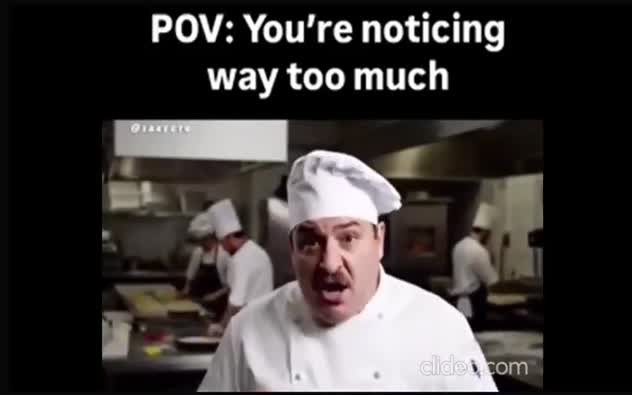








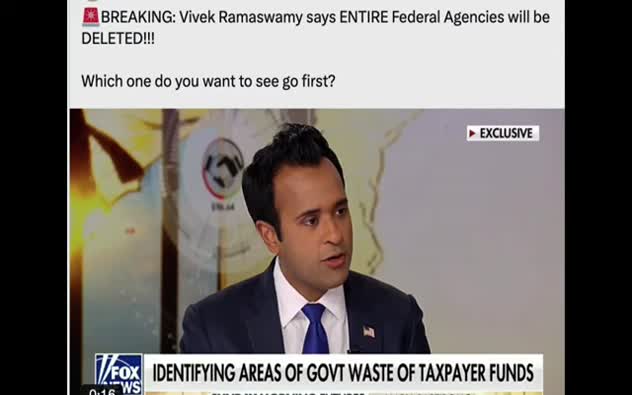
 Donate
Donate